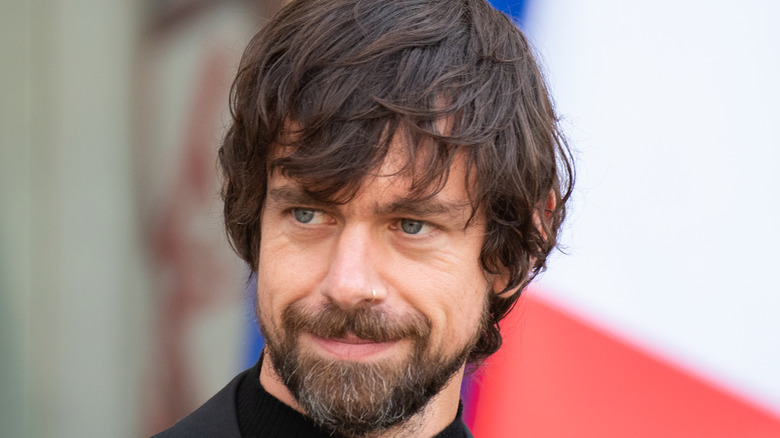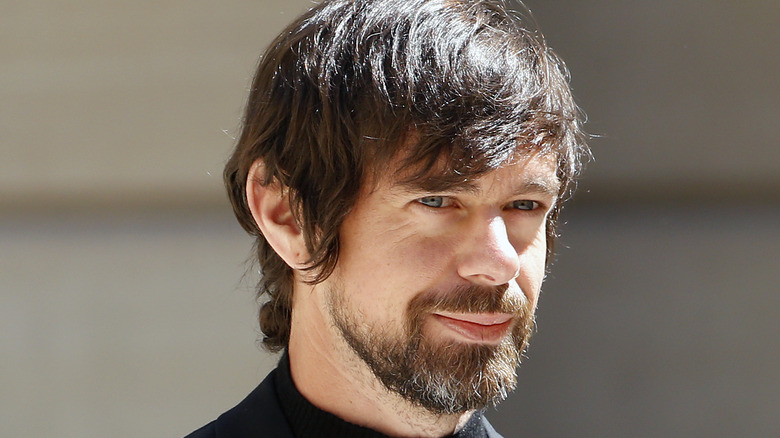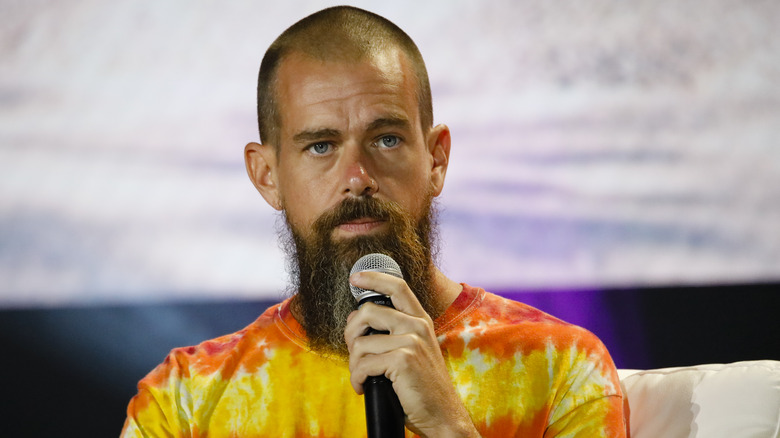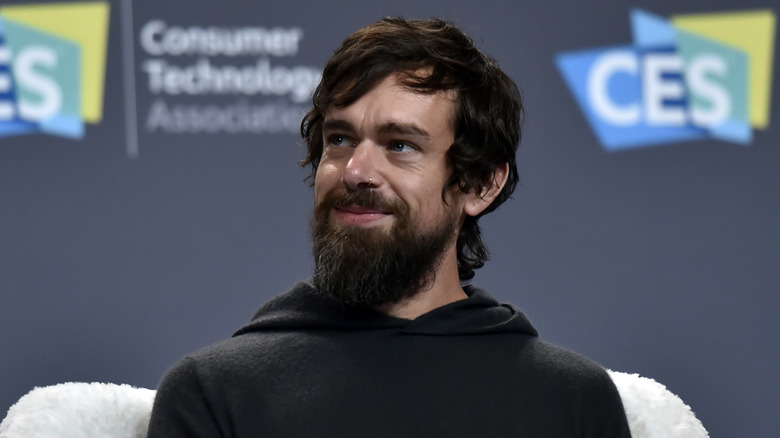Jack Dorsey's Relationship With Twitter Isn't As Good As Everyone Thinks
The month of April 2022 saw Twitter dominate the tech and business headlines, and it wasn't because of something someone had tweeted — well, someone did tweet more than a few things about his relationship with the company, but we'll get to that later. Early in the month, it was reported that Elon Musk had purchased $2.64 billion in Twitter stock since late January (via NBC News), giving him a 9.2% share in the platform's ownership; this came shortly after Twitter CEO Parag Agrawal announced that Musk will be joining the company's board of directors. And on April 25, after several posts from Musk hyping up Twitter's "tremendous potential" and some changes he hopes to bring to the table, the board agreed to Musk's $44 billion takeover bid. That, despite initially turning down the Tesla and SpaceX head honcho's offer.
Somewhat lost in the Musk-related shuffle were the spicy hot takes from Twitter co-founder and former CEO Jack Dorsey. From the very first days of Twitter (or "Twttr," as it was then known) in March 2006, Dorsey had been around, sharing a first tweet that would turn out to be so historic that it was auctioned off as an NFT to celebrate its 15th anniversary. Up to now, he's still the first person people tend to think about when they heard the word "Twitter." But that doesn't necessarily mean his relationship with the company has been smooth sailing — it's actually far from smooth if we're being completely honest.
Dorsey isn't pleased with the Twitter board, and that's a 'big fact'
Amid the hubbub over Elon Musk's Twitter takeover attempt, Jack Dorsey took to the platform he co-founded (where else) on Sunday, April 17, 2022, and replied to a thread where a user commented on the power plays that defined the first few years of Twitter's board of directors. Dorsey tweeted that such actions have "consistently been the dysfunction of the company," but that was nothing compared to what he remarked earlier in the day on the same thread.
Replying to a user who quoted a "Silicon Valley proverb" about how "Good boards don't create good companies, but a bad board will kill a company every time," Dorsey wrote two words that confirmed what he feels about Twitter's board," simply posting, "big facts."
That concise comment, delivered in the lexicon of your average young, hip tech entrepreneur, might have also been Dorsey's response if you told him that he's had a long and oftentimes tense relationship with Twitter. Yes, it is true that Dorsey is, as of this writing, still part of the company's board, and is expected to leave toward the end of May upon the expiration of his term (via NBC News). But certain events from the platform's earlier years underscore how dramatic Dorsey's dealings with Twitter have often been, starting with the time he was fired as CEO for his supposedly incompetent leadership.
Dorsey says he owns 'very little' of the company
If you regularly keep tabs on the tech business space, chances are you're aware that Jack Dorsey was sacked as Twitter CEO in 2008 and replaced by his fellow co-founder, Evan Williams (via Vanity Fair) — Dorsey would, however, become the company's chairman of the board at that time. After serving two years as chief executive, Williams resigned and was replaced by erstwhile chief operating officer Dick Costolo, and when Costolo stepped down in 2015, Dorsey was back in charge as CEO, announcing in a tweet that he was going to give back a third of his stock in the platform to the employees so he can "reinvest directly in our people."
Dorsey revisited that post some six years and a half later, clarifying to his followers that things may not have been that rosy after all when he made the transition from CEO to chair. "When I was fired in 2008 and made chair, the board took most of my shares away from me," he wrote. "I also gave 1% of the company back to the employee pool in 2015. So, [I] ended up with very little of [the] company."
When Dorsey announced he was leaving Twitter in November 2021, he was highly complimentary toward his replacement as CEO, Parag Agrawal. In the letter he attached with his post, Dorsey stressed that he was going to let Agrawal be his own man and do his own thing as chief executive. The language Dorsey used centered on how limiting it is to be in charge of a "founder-led" company, and he displayed a wry sense of humor with that "Hi mom!' at the end. But did he really resign of his own volition, or was he forced out?
Quit, fired, or somewhere in between?
In a piece he published for Vanity Fair shortly after Jack Dorsey announced his resignation from Twitter, Nick Bilton, author of the book "Hatching Twitter: A True Story of Money, Power, Friendship, and Betrayal," sought to answer the aforementioned question of whether or not the two-time ex-CEO voluntarily resigned from the company in 2021. In doing so, he spoke with several unnamed sources familiar with the situation, most of whom theorized that Dorsey was gradually eased out of his role. One interesting development Bilton noted was how Elliott Management, a hedge fund known for its exploits in "activist investing," bought more than $1 billion worth of Twitter stock in 2020 and 2021 and launched a campaign designed to oust the seemingly untouchable Dorsey from his position.
One individual who spoke to Bilton alleged that whereas Dorsey was all chummy with the board in the late 2010s despite Twitter's relatively unremarkable financials, the Elliott deals marked a turning point for his relationship with his fellow directors. "I think it was a bit embarrassing for everyone when Elliott Management showed up and said it wasn't acceptable for a public company of this size to not have a full-time CEO," they revealed. "Two years later, and I think Jack knew that his performance as CEO wasn't up to par, and that while he had held off being ousted before, he knew that it was only a matter of time before other investors, or his new board, would force him out as CEO."
Another one of Bilton's anonymous sources likewise told the journalist that since Dorsey had eased himself back to the chief executive role after getting fired as CEO and becoming chairman of the board, it was decided that the best way to prevent this from happening again was to completely oust him from the company.



